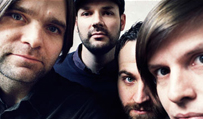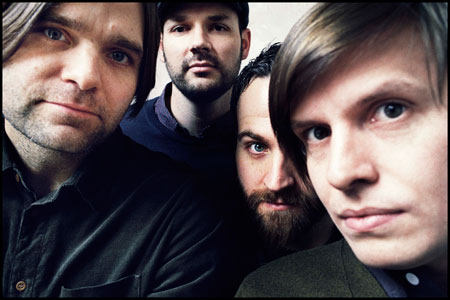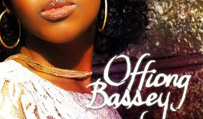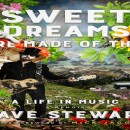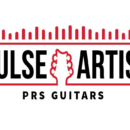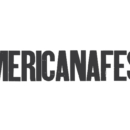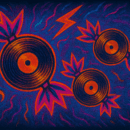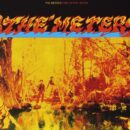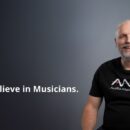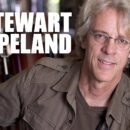Formed in the college enclave of Bellingham, WA, Death Cab For Cutie’s rise has been both steady and epic. From their homemade 1998 cassette through a series of releases for the local Seattle label Barsuk (capped by 2003’s Transatlanticism), the band earned a prominent position in the hierarchy of indie rock music and a devoted following.
Early on, Rolling Stone described the band as conveying “emotion through lack of emotion.” Lead vocalist and songwriter Ben Gibbard’s haunting voice and literate sensibilities gained even more prominence with Postal Service, his one-off collaboration with Jimmy Tamborello, and the ubiquitous “Such Great Heights,” utilized in a number of commercials and in the film Garden State.
Signing with Atlantic in 2004 upped Death Cab’s visibility considerably, as the platinum and Grammy-nominated Plans remained on the Billboard charts for 47 weeks. According to longtime manager Jordan Kurland, after inking with a major label the hard-touring band went from 50,000 to 60,000 records sold per release to over 200,000.
“The main impetus to make the transition to a major was simply to grow Death Cab’s base,” he noted. This blueprint worked: Narrow Stairs, their 2008 collection, hit No. 1 on the Billboard 200 album chart. The Open Door EP, released the next year, was nominated for a Grammy for Best Alternative Music Album, and “Meet Me on the Equinox,” for The Twilight Saga: New Moon, revealed the band, with its current lineup of Gibbard, Chris Walla, Nick Harmer and Jason McGerr, to a new generation of vampire and werewolf aficionados.
Since marrying actress-singer Zooey Deschanel, Gibbard now spends an increasing amount of time in Los Angeles, CA. In this exclusive conversation with MC, he is focused on communicating his zeal for the newest Death Cab For Cutie release, Codes and Keys.
Music Connection: When we last spoke, you claimed that Los Angeles made you claus-trophobic. Have you changed your opinion?
Ben Gibbard: I think I’ve learned something about Los Angeles that people here have known for years. Los Angeles is not one city; it’s nine small cities and you find the one you like. It’s become a much smaller, cozier place than I initially thought it was. I think back in the day when we would come to Los Angeles we would be driving down the 5 Freeway into some club. It wasn’t the best way to be introduced to the city.
MC: And you recently ran a 26-mile marathon across town to benefit 826LA, a literacy organ-ization, correct?
Gibbard: I did. It was by leaps and bounds the hardest thing I’ve ever done. It was raining that day, big gales, a downpour of rain. It was like a bad day in Seattle. It was already an incredibly challenging feat, and by mile 13 it was like jumping in a pool fully clothed before trying to run the second half. I finished in four hours, which was my goal. Maybe as I recover from this one I’ll run one for Seattle or other cities, but I’m not there yet. I’m still reeling from the first one.
MC: The sonic architecture of your newest CD, Codes and Keys, is a departure from its predecessor, Narrow Stairs. What were the thoughts in developing the new textures and tones?
Gibbard: Every record we do is always an end product of the kind of songs I’m bringing in. And with the last record, Narrow Stairs, I wrote the majority of those songs on guitar. They were riff-oriented kinds of tunes. The record lent itself well to us in a room playing live, recording as much as possible to tape. And that record was a much more organic, analog kind of experience. With this record I was turning in songs in much more of a bare bones fashion. They were certainly less guitar-riff oriented.
When you combine that with the fact that Chris (Walla) has become inspired in the past couple of years by this bank of analog synths, when we got in the studio it was only fitting that we would attack the songs in that manner. And also this record was very much a construction project. I would do a guide track with the barest set of sounds and then we would build on top of that. With every record we make, the songs define the approach.
MC: What is your songwriting instrument of choice?
Gibbard: I feel most comfortable with an acoustic guitar in my hands. I can strum a G chord forever and be okay with that. Everything starts with an acoustic guitar for me. Sometimes I’ll program a beat and play electric guitar, but for the most part nothing gets me humming a melody more than an acoustic guitar. I’m not saying I have proficiency on the instrument, but the acoustic is a go-to thing.
MC: How did the new song “Underneath the Sycamore” develop? It has particularly cin-ematic lyrics.
Gibbard: Interestingly enough, they were first in-spired by a book by Hubert Selby Jr. that I really liked. I tend to take ideas and inspiration not only from things happening around me, as a human being with his eyes and ears open, but from things I inject and enjoy and from the book and from my own life. I end up weaving two or three ideas. It’s all of the three, and none of them, if that makes sense. There are moments in that song that could be taken––erroneously to a certain extent––as reflections of my life. But at the same time I feel the metaphors and structure of the song have a more universal appeal than someone thinking I’m just writing about my own life.
MC: You once noted that among popular arts, only in songwriting is the assumption made that the writer is revealing his or her own story.
Gibbard: As songwriters tend to use the personal pronoun and write in the first person, there’s always this assumption that songwriters are writing about their own lives all of the time. Or you’re supposed to see the songwriter as the narrator.
Most of the time for me, that’s simply not true. There’s mystique built into the idea of being a confessional songwriter. People find a lot of comfort in that. I’m not one to burst that bubble, but I think that given the nature of my personal life it’s something I need to continue to remind people of.
MC: Are we correct in noticing lighter, more melodic nuances in Codes and Keys that are a departure from the previous album?
Gibbard: The one thing I’m very proud of with this record is it’s emotionally balanced. Narrow Stairs is the darkest record we ever made. Lyrically, it’s incredibly dark. Just as a human being, let alone being a songwriter, I came out of the experience saying, “I don’t want to write that record again.”
MC: The music press has noted the maturation of the band, and marriages, including your own, for more upbeat emotions. Is this accurate?
Gibbard: I think it would be a dismissive per-spective on this album for people to say it’s a marriage record, a happy record. It’s not. If you dig into the material, there are two or three songs on the there that are very light and meant to be those uplifting pop song moments within the al-bum. “Stay and Go Dancing” to me is as uplifting and poppy as “Such Great Heights,” but there are songs on the record that deal with really heavy stuff.
I would be disappointed if people wanted to dismiss this album based on the fact that there are three or four songs that are a more uplifting spirit than the last record. But if people feel that about it, I can’t really change their minds.
MC: How did you handle the sequencing?
Gibbard: In making records we have a real sense of what we want to start and end. We came to the realization that with virtually every record with the exception of We Have the Facts and We’re Voting Yes, and, to an extent, The Photo Album, the last three records have ended on a really down note with very slow, sad songs. Now, having a song like “Stay Young and Go Dancing” in the repertoire—I’m a little self-conscious how up the song is. But we decided let’s give the listener the exact opposite ending this time. It closes the record on a much higher note that we’ve allowed the listener in the past. We make decisions like that, and then we build from the outside in.
MC: You brought in famed engineer-producer Alan Moulder to mix Codes and Keys. What was the motivation behind that?
Gibbard: Chris Walla had been interested in having Moulder mix for some time, once we got a sense of the tone of the album, the sonic palette. Chris is not only in the band, but he’s producing and mixing the records. That hasn’t been problematic in the past, but it’s put us in the position of having the same person at the helm from start to finish. Through time, we’ve decided we might benefit from having an outside mixer come in, and lend their ear to it, and have an objective opinion of the tone of the record.
When you’re making a record there is inevitably going to be some time when you spend a day and a half trying to make an eight-bar keyboard part perfect. You spend all the time on this part, and when you’re mixing the record you remember how long it took to get that part, so you give it an added importance that maybe it shouldn’t have. Alan Moulder brought focus to the songs.
![]()
![]() MC: You tracked at a number of different stu-dios in a variety of cities: Los Angeles, San Francisco, Seattle and Vancouver. How did this approach affect the recording process?
MC: You tracked at a number of different stu-dios in a variety of cities: Los Angeles, San Francisco, Seattle and Vancouver. How did this approach affect the recording process?
Gibbard: We’ve learned by trial and error that when we decide to hole up in the same studio for a month or two months, there is this week where we hit a wall. We’re too close to everything. We can’t hear what’s working and what’s not and we lose perspective. We preempted that this time with the idea, ‘Let’s go into the studio for two weeks, take two weeks off, go back into a studio in a different place and do two weeks there.” It broke up the monotony of going to the same office every day.
It allowed me more time to get writing done. If we said, “April through June we do the record,” there was not time for me to write, or rewrite lyrics. As much as I love playing music, I’m only good playing music about six to eight hours a day. I can’t go home and write or listen to music. If I have my ear to the minutiae of recorded music for eight hours, I’m shot.
To spend two weeks, then come home and go into my little work studio, goof off, write a couple of songs…I think I wrote the best songs on the record in those two-week periods between recording. Because I just felt like going into my studio and playing guitar. Then all of a sudden, either when I’m trying or the least conscious of it, I feel like I do my best work.
MC: So does the outside mixer have a pragmatic view of this process?
Gibbard: Yes. When you bring in an outside mixer, he might say, “This works, this doesn’t, this might be better.” They’re not attached to the record making process. They’re just trying to present what’s there in the best possible way. I don’t mean this as a slight to Chris, but a fact of working with producers who make records is that they were in the studio when the sounds were made, and they have their feelings about them, because they spent so much time getting them.

MC: Were there any surprises that you en-countered?
Gibbard: I was listening to the rough mixes with nothing EQ’d, and they were flat sonically and emotionally. And the first mix was “Portable Television.” It had so much energy. I never heard the intensity in the recording process in the rough mix––I didn’t hear it until Alan’s mix. That was such a strange thing for me; I’d never had an experience like that. It’s what he gets paid to do. He’s very good at it.
MC: We came across a website that listed all of the songs you’d ever covered, and it was a very telling portrait of your consciousness as a music fan.
Gibbard: When I was younger I had blinders on. I only liked listening to contemporary music. Erroneously, or foolishly, I felt that the only good music was what was happening now. Later, in my mid-20s, I started looking back and investigating the history of rock & roll, enjoying the lost heroes of rock & roll, the people that time forgot. Those stories are so interesting to me, geniuses being gobbled up by the music industry in the ‘60s and ‘70s.
Thankfully, we live in a world where there will never be another secret band 20 years from now, who we realize was making good music and nobody who was into good music was able to hear it until they were done––unless they don’t record anything.
MC: Is this democratic access to music helpful in the art of popular music?
Gibbard: In a way I feel that it’s kind of a good thing. If you’re making brilliant music in Montana, you don’t have to be a part of a music scene to get heard. There are people spending their entire lives trolling Myspace and music blogs to discover and shepherd the next big thing.
In my own music listening, I find myself wanting to listen to non-contemporary music. It has a mystique and a mystery that doesn’t exist with Arcade Fire. And I love the Arcade Fire. We are contemporaries; we know them, we know how they make music, we have mutual friends––but there’s no mystery. For me the mystery of rock & roll is what attracted me to it in the first place. I can lose myself in the mystery of old music in a way I can’t when I listen to a band whose record came out last week.
MC: What would you like to happen with Codes and Keys, Ben?
Gibbard: With every record we make I want the same thing. I want people to buy it, for it to be something they thoroughly enjoy and for them to find themselves in the record. But I think what I’m always hoping for with any album we make ––humbly hoping––is what I want from records made by my favorite bands seven or eight albums in. That there is a sizable portion of it that goes onto people’s mental “Best of Death Cab” playlist. Every time there’s a new Low or a Teenage Fan Club record, there are four or five songs I love that go into my own “Best Of” collections.
At the end of the day, outside of the loftier goals––if it was named Record of the Year and sold 55 zillion copies, of course that would be nice, I’m not going to lie––but at this point I want to make music that satisfies the people who have been fans of the band for years. I want the fans to grow with us.

